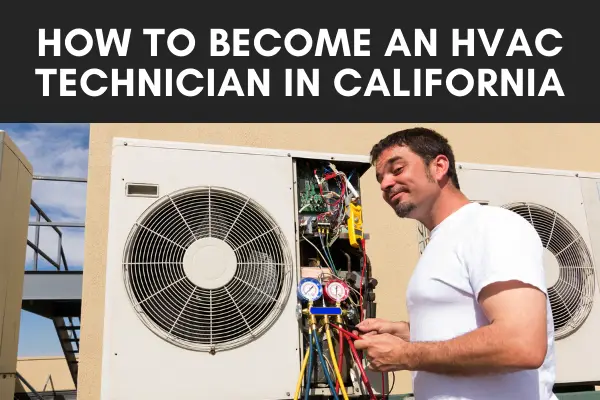Heating, ventilation, and air conditioning (HVAC) technicians in California can enjoy a comfortable average salary of $53,700 per year – roughly 8% higher than the national average for HVAC techs. If you’re thinking of moving to CA or are a current resident exploring career options, this position may be a good fit for you.
You can become an HVAC tech by completing post-secondary HVAC education and/or an apprenticeship in CA. Some of these courses grant certificates upon completion, but certificates are only required if you plan to work with refrigerants. HVAC contractors, on the other hand, are required to hold a California HVAC Contractor License.
This article will discuss how to become an HVAC technician in California, HVAC tech certifications, and how to receive an HVAC Contractor License.
Do You Need an HVAC License in California?
HVAC licenses are only required for HVAC contractors in the state of California.
HVAC technicians can complete coursework to learn the trade and then work for a licensed contractor.
HVAC techs may also receive one or more HVAC certificates given through the U.S. Environmental Protection Agency (EPA). If you are an HVAC tech planning to work with refrigerants, you are required to receive your EPA Technician Certificate.
Becoming an HVAC Tech in CA
Becoming an HVAC tech in CA is generally done through post-secondary education. These programs are paired with on-site work experience, as many are considered apprenticeships.
Once you complete a program or apprenticeship, you may apply to different HVAC tech positions. Joining a union may or may not be required depending on your employer.
Before, during, or after working as an HVAC tech, you may choose to receive an HVAC certificate from the EPA. EPA certifications can make you a stronger candidate for certain HVAC jobs. Those HVAC techs working with refrigerants are required to receive the EPA Technician Certification.
HVAC Tech Post-Secondary Education
To start a post-secondary HVAC program, you’ll need to have your high school diploma or the equivalent. HVAC programs come in all shapes and sizes, with many lasting anywhere from 6 months to 2 years.
Apprenticeships are also available and can be found on the California apprenticeship database.
To choose your post-secondary HVAC program, consider the program’s:
- Courses: These should include basic HVAC subjects, as well as courses on water heaters and combo systems, power tools, service and troubleshooting, mechanical controls, OSHA safety protocols, blueprint reading, and more.
- Reputation: Be sure to read the reviews of the program and investigate how many students have (satisfactorily) completed its programs in the past.
- Instructors: To learn the trade correctly, you’ll want to make sure your instructors have plenty of experience both in the field and in the classroom.
- Work experience: Classroom hours are important, but hands-on learning in the HVAC field is invaluable. Look for a program that offers at least one year of full-time, hands-on experience working under an experienced HVAC tech or contractor.
- Accreditation: Perhaps most importantly of all, your program should be accredited by the state of California.
The length of time you dedicate to becoming an HVAC technician will impact which program you choose. While some programs are shorter, the more education and experience you gain, the better equipped you’ll be in the HVAC field. Lengthier programs can even put you on the path to earning an associate’s degree in a related subject.
EPA Certifications for HVAC Techs
If you are an HVAC tech planning to work with refrigerants, you’ll need to get your EPA Technician Certification. To do this, you must pass the Section 608 EPA-approved test given by an EPA-approved organization. These are open book exams and the credential never expires.
In addition to this certificate, you can also take an exam for the following certifications:
- Type I: For servicing small appliances
- Type II: For servicing high-pressure appliances
- Type III: For servicing or disposing of low-pressure appliances
- Universal: For servicing all types of equipment
You must pass an exam to receive a certification. Each certificate exam covers different topics. Some EPA-approved organizations will provide training materials in conjunction with the EPA certification exam. For a list of approved organizations, see the EPA’s website.
Unions for HVAC Techs
Since California is not a “right to work” state, some employers may require you to join a union to be hired.
The two largest unions for HVAC employees in California are the United Association of Journeymen and Apprentices of the Plumbing, Pipefitting, and Sprinkler Fitting Industry of the United States and Canada (United Association or UA) and the International Association of Sheet Metal, Air, Rail, and Transportation Workers (SMART).
You can learn more about joining a union by exploring your preferred union’s membership page.
HVAC Contractor Licenses in CA
Becoming a licensed specialty HVAC contractor in CA can expand your career opportunities in the HVAC field. Contractors work for themselves and may hire HVAC techs as employees. They can do all things HVAC technicians do, plus design entire HVAC systems for new buildings and other projects valued at over $500.
Some HVAC techs may also specialize and work as solely a Licensed Refrigeration Contractors.
HVAC Contractor Requirements
To be a licensed HVAC contractor, you must pass a 2-part exam.
To qualify for the exam, you must have worked as a full-time journeyman HVAC tech for at least 4 years before applying to be an HVAC contractor. Journeyman techs have completed 1-4 years of accredited training, including at least one full year of practical experience.
Application
You can complete the contractor license exam application online, via printed PDF, or request to have the application mailed to you.
On your application, you will be required to show proof of work experience, as well as a bond of at least between $12,500 and $15,000. You’ll also need to fill out a disclosure statement around any prior criminal pleas or convictions. Finally, you’ll pay the appropriate license and examination fees before submission.
Be sure to complete the application in its entirety, with all appropriate documentation attached. If incomplete, the application will be returned to you and it will not be reviewed until everything is in order.
Once approved, you’ll schedule and sit for the exam. When you pass the exam, you’ll receive your California HVAC Contractor License.
For more information on the contractor licensure procedure, see here.
HVAC Contractor Reciprocity
California has reciprocity agreements for HVAC contractors from Arizona, Louisiana, and Nevada.

